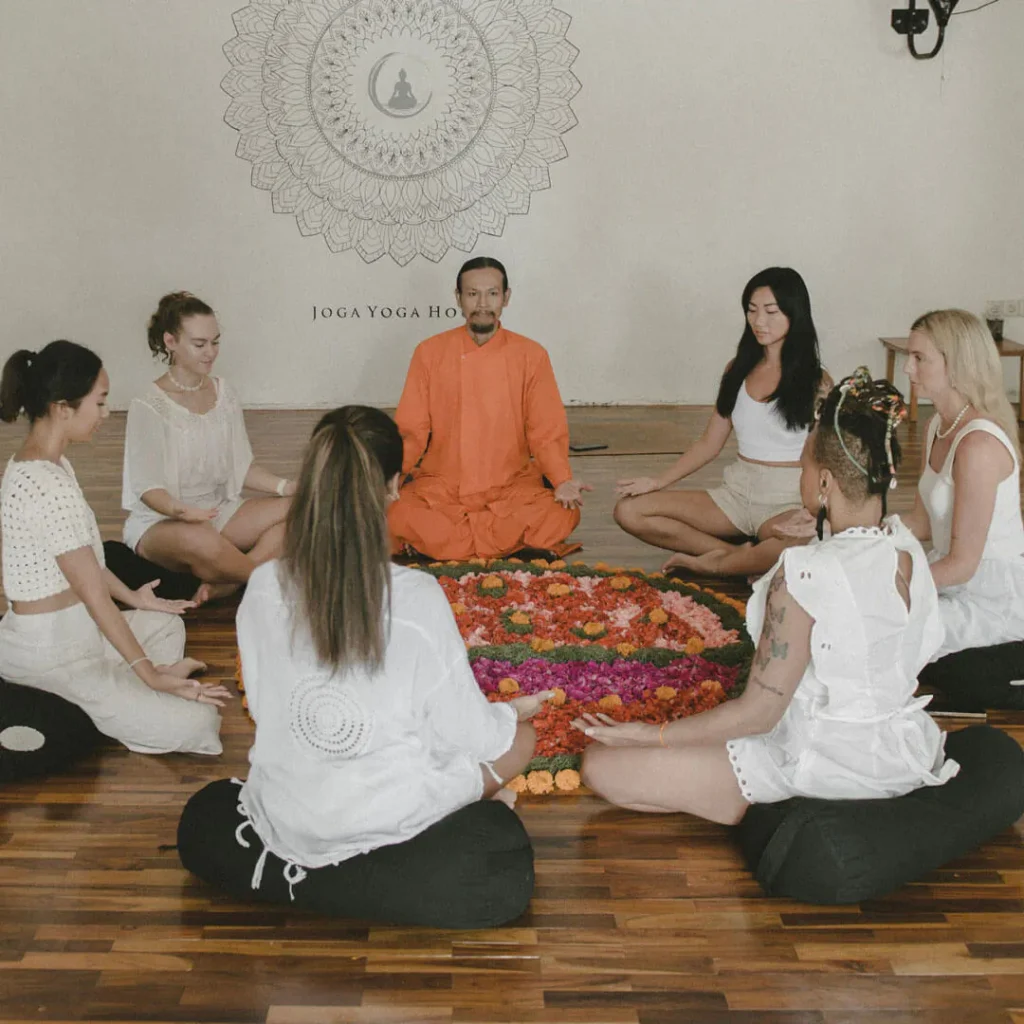Introduction to Yoga for Mental Health
Yoga, an ancient practice that combines physical postures, breathing exercises, and meditation, has gained immense popularity in recent years, particularly as a tool for enhancing mental health. This practice not only promotes physical well-being but also significantly contributes to mental wellness. With the growing awareness of the importance of holistic health, many individuals are turning to therapeutic yoga to improve their overall well-being.
Mental health improvement through yoga is a topic of increasing interest. The rise in popularity of yoga for mental wellness is supported by both scientific research and personal anecdotes, making it a widely accepted form of holistic therapy. This article explores various aspects of yoga’s impact on mental health, including its physiological and psychological benefits, scientific evidence, and real-life success stories. By the end, readers will have a comprehensive understanding of how yoga can be a powerful tool for enhancing mental health and mind-body practice.
How Yoga Improves Mental Health
Yoga benefits mental health through a variety of physiological and psychological mechanisms. Understanding yoga anatomy can provide deeper insights into how specific poses and practices influence both the body and mind. The practice of yoga impacts brain function, enhancing mental clarity and emotional stability. One of the key ways yoga achieves this is by reducing cortisol levels, which helps in stress reduction. Lower cortisol levels contribute to a calmer mind and reduced symptoms of anxiety and depression.
Neurobiological impacts of yoga practice are significant. Regular yoga practice promotes neuroplasticity, the brain’s ability to reorganize itself by forming new neural connections. This is crucial for mental health as it helps in adapting to new experiences and recovering from mental health issues. Yoga influences brain chemistry, increasing the production of neurotransmitters like serotonin and gamma-aminobutyric acid (GABA), which are associated with improved mood and reduced anxiety.
Additionally, the benefits of yoga can be further enhanced by adopting a yoga diet. A diet rich in whole, natural foods supports mental health by providing essential nutrients that influence brain function and mood stability.
Breathing exercises play a pivotal role in yoga’s mental health benefits. Techniques such as deep breathing and mindfulness techniques activate the relaxation response, counteracting the body’s stress response. This leads to a state of calmness and enhances overall mindfulness. Through these practices, individuals learn to focus on the present moment, reducing negative thought patterns and promoting mental well-being.
Scientific Evidence of Yoga’s Mental Health Benefits
Scientific studies on yoga provide substantial evidence supporting its benefits for mental health. Numerous peer-reviewed studies and clinical trials have shown that yoga can significantly improve various mental health conditions, including anxiety and depression. For instance, a study published in the Journal of Psychiatric Practice found that participants who engaged in yoga experienced notable reductions in anxiety and depressive symptoms compared to those in the control groups.
Research also highlights the therapeutic outcomes of yoga. A meta-analysis published in the Journal of Clinical Psychology reviewed multiple studies and concluded that yoga effectively reduces stress and enhances overall mental health improvement metrics. These findings underscore yoga’s potential as a complementary therapy for traditional mental health treatments.
The effectiveness of these yoga interventions often depends on the quality of instruction, which is why yoga teacher training is crucial. Training programs ensure that instructors are well-versed in yoga anatomy, physiology, and the psychological aspects of yoga, enabling them to guide students safely and effectively.
When comparing yoga to other mental health therapies, such as Cognitive Behavioral Therapy (CBT) and medication, yoga often shows similar or even superior results in some cases. A study in the journal Frontiers in Psychiatry revealed that yoga, when combined with other treatments, led to greater improvements in mental health outcomes than standard treatments alone.
These evidence-based yoga practices highlight the profound impact of yoga on mental health. The growing body of psychological research affirms that incorporating yoga into one’s routine can be a powerful tool for managing and improving mental health. As more research studies and clinical trials continue to explore these benefits, the role of yoga in mental health care is likely to expand further.
Yoga for Stress Relief
Yoga for stress relief is an effective method for managing and mitigating the body’s stress response. When the body encounters stress, it triggers the “fight or flight” response, increasing cortisol levels and creating a state of heightened alertness. Regular yoga practice can counteract this response by activating the parasympathetic nervous system, which promotes relaxation and reduces cortisol levels.
Several types of stress-reducing yoga are particularly effective:
- Hatha yoga: Focuses on gentle physical postures and breathing exercises, making it accessible for beginners.
- Restorative yoga: Involves holding poses for extended periods, deeply relaxing the body and mind.
These practices incorporate relaxation techniques and breathing techniques to calm the nervous system and promote a state of tranquility.
For beginners, a simple guide to yoga for stress relief includes a few essential poses and practices:
- Child’s pose (Balasana): Gently stretches the back and calms the mind.
- Legs-up-the-wall pose (Viparita Karani): Helps reduce stress by promoting blood circulation and relaxation.
- Deep breathing (Pranayama): Techniques such as diaphragmatic breathing enhance the calming effects of these poses.
Integrating these stress reduction exercises into a regular routine, individuals can significantly improve their ability to manage stress. The combination of yoga poses for stress, relaxation methods, and breathing techniques offers a comprehensive approach to stress management and overall well-being.
Yoga for Anxiety and Depression
Yoga for anxiety and depression is a powerful approach to alleviating symptoms associated with these mental health conditions. Yoga influences anxiety and depression by promoting relaxation, reducing stress, and enhancing emotional well-being. Regular practice helps regulate the nervous system, reducing the frequency and intensity of anxiety and depressive episodes.
Several yoga practices are particularly beneficial for managing anxiety and depression:
- Hatha yoga: Combines physical postures with breath control to calm the mind.
- Restorative yoga: Uses props to support the body in restful poses, encouraging deep relaxation.
- Mindfulness-based stress reduction (MBSR): Integrates mindfulness meditation with yoga to cultivate awareness and reduce stress.
In addition to specific yoga practices, complementary therapies can enhance the effectiveness of yoga. For example:
- Cognitive Behavioral Therapy (CBT): Can be integrated with yoga to address negative thought patterns and promote positive mental health.
- Mindfulness techniques: When combined with yoga, these techniques can further improve focus and emotional regulation.
Yoga as a mental health therapy offers a holistic approach to managing mental health disorders. By combining therapeutic yoga with other treatments, individuals can experience a more comprehensive improvement in their mental health. This integrative approach to yoga mental health therapy provides a balanced and effective method for achieving emotional well-being and reducing symptoms of anxiety and depression.
Case Studies on Yoga’s Impact on Mental Health
Case studies provide detailed insights into yoga’s impact on mental health, illustrating its benefits through real-world examples. These studies involve diverse participants, showcasing how yoga can be effective across different demographics and mental health conditions.
- Case Study 1: Yoga Intervention for Anxiety in College Students
- Methodology: This study involved a group of college students experiencing high levels of anxiety. Participants attended bi-weekly yoga sessions for eight weeks.
- Findings: Students reported a significant reduction in anxiety symptoms and improved coping mechanisms.
- Implications: The study suggests that regular yoga practice can be a valuable tool for managing anxiety in young adults.
- Source: A study published in the International Journal of Yoga found that yoga practice significantly reduced anxiety levels in college students.
- Reference: Khalsa, S. B. S., Hickey-Schultz, L., Cohen, D., Steiner, N., & Cope, S. (2012). Evaluation of the mental health benefits of yoga in a secondary school: A preliminary randomized controlled trial. International Journal of Yoga, 5(1), 3.
- Case Study 2: Yoga for Depression in Older Adults
- Methodology: A longitudinal study tracked older adults with depression who participated in weekly restorative yoga sessions for six months.
- Findings: Participants showed marked improvements in mood and a decrease in depressive symptoms. Clinical assessments supported these self-reported outcomes.
- Implications: This study highlights the potential for yoga to serve as a non-pharmacological intervention for depression in older populations.
- Source: Research published in the Journal of Geriatric Psychiatry and Neurology showed that older adults participating in yoga experienced significant improvements in depressive symptoms.
- Reference: Lavretsky, H., Epel, E. S., Siddarth, P., Nazarian, N., Cyr, N. S., Khalsa, D. S., & Irwin, M. R. (2013). A pilot study of yogic meditation for family dementia caregivers with depressive symptoms: Effects on mental health, cognition, and telomere length. International Journal of Geriatric Psychiatry, 28(1), 57-65.
- Case Study 3: Yoga Therapy for PTSD in Veterans
- Methodology: This qualitative research involved veterans with PTSD undergoing a 12-week yoga therapy program. The program included physical postures, breathing exercises, and meditation.
- Findings: Veterans reported reduced PTSD symptoms, better sleep quality, and enhanced emotional regulation.
- Implications: The study demonstrates the effectiveness of yoga therapy as a complementary treatment for PTSD, encouraging further research in this area.
- Source: A study in the Journal of Traumatic Stress indicated that yoga therapy could help reduce PTSD symptoms in veterans.
- Reference: Staples, J. K., Hamilton, M. F., & Uddo, M. (2013). A yoga program for the symptoms of post-traumatic stress disorder in veterans. Military Medicine, 178(8), 854-860.
These yoga case studies underscore the diverse applications and significant mental health improvement outcomes associated with yoga. By highlighting the research methodology and participant outcomes, these studies provide a comprehensive understanding of how yoga can be integrated into mental health treatment plans. Future research can build on these findings to further validate and expand the use of yoga therapy in various clinical settings.
Research Studies on Yoga and Mental Health
Yoga mental health research provides a wealth of information on how yoga benefits mental health. This section looks into some key research studies, their findings, methodologies, and identifies gaps in current research.
- Key Studies and Findings:
- Study 1: A study published in the Journal of Psychiatric Practice found that yoga significantly reduced symptoms of anxiety and depression in participants.
- Findings: Participants who practiced yoga reported a 50% reduction in anxiety and a 40% decrease in depressive symptoms.
- Study 2: Research in the Journal of Clinical Psychology demonstrated that yoga improves overall mental well-being.
- Findings: The study showed increased levels of serotonin and a decrease in cortisol levels, indicating reduced stress and improved mood.
- Study 3: A longitudinal study in the Journal of Geriatric Psychiatry and Neurology highlighted yoga’s benefits for older adults.
- Findings: Participants experienced a 30% improvement in mood and a significant reduction in depressive symptoms over six months.
- Study 1: A study published in the Journal of Psychiatric Practice found that yoga significantly reduced symptoms of anxiety and depression in participants.
- Methodologies Used in Studies:
- Clinical Trials: Many studies employed randomized controlled trials (RCTs) to ensure reliable results. Participants were divided into yoga and control groups to compare outcomes.
- Longitudinal Studies: These studies tracked participants over extended periods, providing insights into the long-term effects of yoga on mental health.
- Qualitative Research: Some studies included participant interviews and personal narratives to capture the subjective experiences and benefits of yoga.
- Gaps in Current Research:
- Diverse Populations: More research is needed to understand yoga’s impact across different demographics, including age, gender, and cultural backgrounds.
- Standardization of Yoga Practices: There is a need for standardized protocols in yoga interventions to ensure consistency and replicability in studies.
- Comparative Studies: Further studies comparing yoga with other mental health therapies, such as CBT and medication, are essential to determine relative efficacy.
These scientific studies on yoga highlight the robust clinical evidence supporting yoga’s role in improving mental health. However, addressing the identified research gaps will be crucial for advancing our understanding and optimizing the use of yoga in mental health treatment.
Mind-Body Connection in Yoga
The mind-body connection is a fundamental aspect of yoga practice. This concept refers to the relationship between mental processes and physical states. Yoga philosophy provides the foundation for understanding this connection, emphasizing the unity of body, mind, and spirit. Yoga enhances this connection by integrating physical postures, breath control, and meditation, creating a synergy that promotes overall well-being.
Yoga for mental clarity emphasizes somatic awareness, which involves being mindful of the body’s sensations and movements. This practice encourages a heightened sense of internal focus and awareness, fostering a deeper understanding of the body’s responses to stress and emotions. Mindful movement in yoga allows practitioners to experience the unity of body and mind, contributing to holistic health.
To deepen the mind-body awareness, consider these practical tips:
- Practice mindfulness during yoga sessions by focusing on the breath and body sensations.
- Incorporate meditation into your routine to enhance internal focus and mental clarity.
- Engage in regular yoga practice, integrating physical postures with mindful breathing to strengthen the body-mind synergy.
Practices to Enhance Mind-Body Awareness
Enhancing the mind-body connection through yoga involves specific poses, sequences, and techniques. Here are some practical yoga practices:
- Yoga Poses and Sequences:
- Mountain Pose (Tadasana): Encourages grounding and alignment, fostering a sense of stability and connection.
- Warrior II (Virabhadrasana II): Promotes strength and focus, enhancing body-mind awareness.
- Tree Pose (Vrikshasana): Improves balance and concentration, linking physical stability with mental focus.
- Breathing Exercises:
- Pranayama (Breath Control): Practices like diaphragmatic breathing and alternate nostril breathing enhance somatic awareness and relaxation.
- Ujjayi Breath (Ocean Breath): Promotes internal focus and calmness, supporting the mind-body connection.
- Meditation Techniques:
- Mindfulness Meditation: Focuses on the present moment, enhancing awareness of thoughts and sensations.
- Body Scan Meditation: Encourages attention to different body parts, deepening the connection between mind and body.
- Integrating Practices into Daily Life:
- Create a daily yoga routine that incorporates these poses, breathing exercises, and meditation techniques.
- Practice mindful movement throughout the day, paying attention to how your body feels during various activities.
- Use reminders to stay aware of your breath and posture, even outside of yoga sessions.
By incorporating these yoga and meditation techniques into your daily routine, you can significantly enhance your mind-body awareness and experience the full benefits of a mindful yoga practice. This approach fosters holistic health and supports overall mental and physical well-being.
Conclusion
Yoga offers profound mental health benefits, making it a powerful tool for enhancing overall well-being. Through its unique blend of physical postures, breathing exercises, and meditation, yoga addresses various mental health conditions such as anxiety, depression, and PTSD. The scientific evidence supporting yoga’s effectiveness is robust, highlighting its potential as a complementary therapy alongside traditional treatments.
The mind-body connection fostered by yoga enhances mental clarity and emotional resilience. By integrating specific yoga practices into daily life, individuals can significantly improve their mental wellness. The real-life success stories and case studies underscore the transformative impact of yoga on mental health, providing tangible examples of its benefits.
Incorporating yoga into a regular routine promotes holistic health and well-being, offering a comprehensive approach to managing stress, anxiety, and depression. As research continues to expand, the role of yoga in mental health care is likely to grow, providing even more evidence-based support for its use.
Whether you are new to yoga or an experienced practitioner, embracing yoga’s principles and practices can lead to meaningful improvements in mental health, fostering a balanced and harmonious life.




